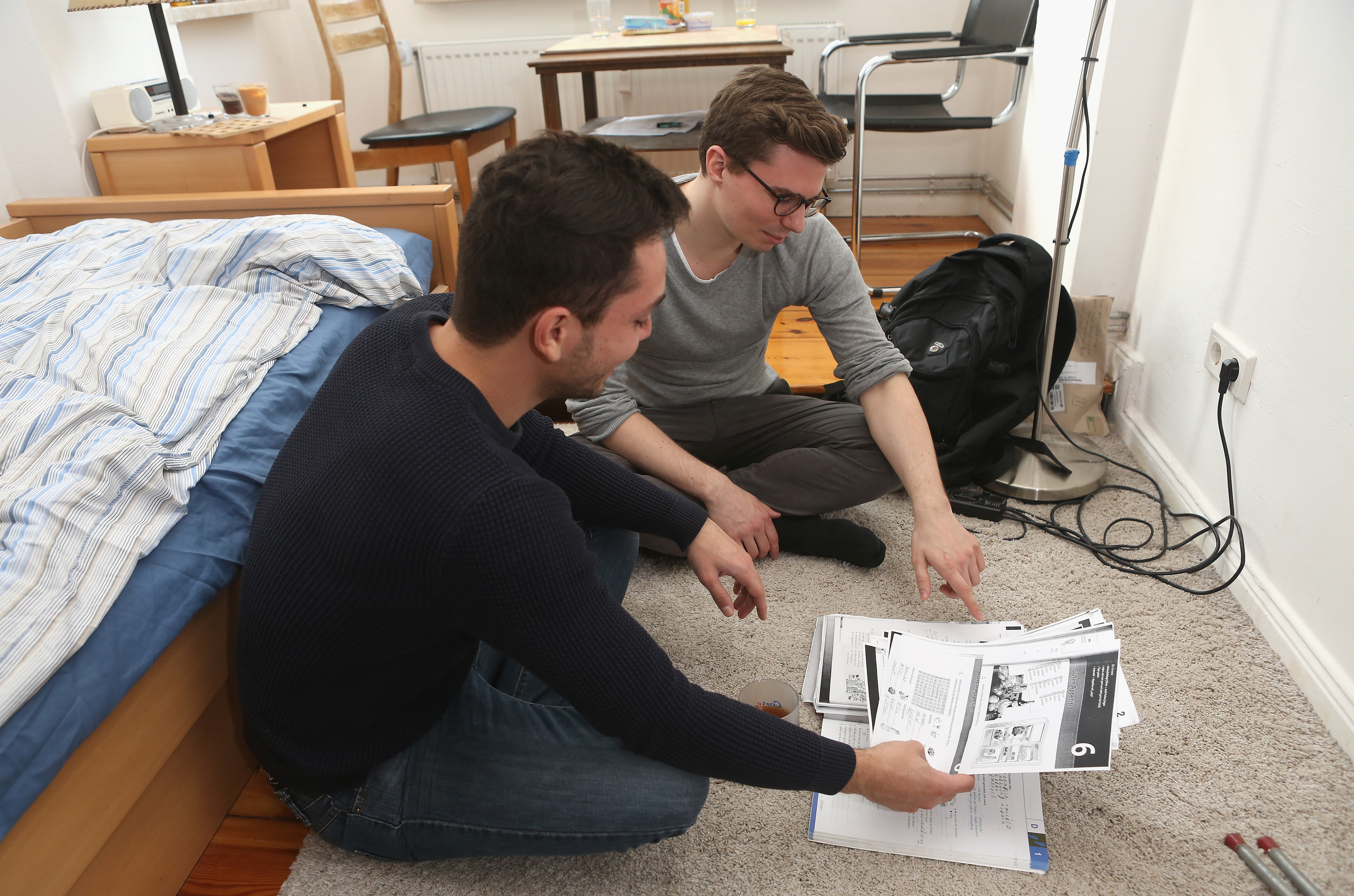When the Syrian army draft papers came in, his father told him it was time to get out.
So Hamad,* a 24 year-old IT student in Damascus, hit the road for a perilous month and a half: through Turkey, Greece, Macedonia, Serbia, Croatia, Slovenia, Italy and France, then, last September, into Germany.
The German social services, overwhelmed, lodged him in a disused Berlin classroom with eight other men.
“If nine people are living in the same room, there will be problems. One person wants to sleep, another doesn’t want to sleep; someone wants the lights on, another doesn’t, and so on,” Hamad said.
An internet-based organization called Refugees Welcome (Flüchtlinge Willkommen), often described as Airbnb for refugees, fixed his problems.
It brought Hamad together with medical student Constantin Thieme, also 24. Hamad now has a room of his own in Thieme’s apartment: a dresser, cupboard, bed, and a window with a view on his new neighborhood, in the gentrifying district of Wedding.
Thieme said it was easy to offer up the extra bedroom through the website, which connects refugees with families, retirees, students—anyone with a room to spare. He was already renting out his bedroom on a short-term basis; this way, he could help refugees at the same time.
The two men first met in Thieme’s kitchen. It was short. “We didn’t actually say much. It was just obvious to me we would get along,” he said, as Hamad laughed in agreement.
Refugees Welcome was created in late 2014 by three young Germans, Mareike Geiling, Jonas Kakoschke and Golde Ebding. Their motivation was to better house refugees often living in camps outside towns and cities, and therefore deprived of any chance to integrate.
The organization now has six full-time staff and 60 volunteers, and has helped house some 287 refugees across Germany. Its success is spreading as far and wide as the refugees themselves, with national websites in Portugal, the Netherlands, Canada, Austria, Spain, Poland, Greece, Sweden and Italy. More than 5,000 flatshares are currently registered worldwide.
After users register an available room, the charity connects them with local refugee organizations who have lists of registered asylum seekers.
Refugees Welcome can even help find ways to pay the refugee’s rent, if needed. Thieme, for example, raised €500 (US$560) from Facebook friends while waiting for Hamad’s paperwork to be completed by the government.
“It was really amazing how positive the reactions were, because many of them just said ‘It’s great, this is something where you really see where the money goes and it’s not so anonymous.’ ”
To ensure the match will be good, people offering lodging are asked what languages they speak, what their housemates, if any, are like, and to describe their city and surroundings. The website’s volunteers mediate any disputes or problems in flatshares, which must last at least half a year, and usually last from eight to 12 months.
If things do not work out after a refugee has moved in—and this has only happened in a small number of cases—he or she is offered accommodation elsewhere.
Co-founder Mareike Geiling, who hosts a refugee herself, said there have been growing pains because of the massive flow of refugees to Germany—more than a million last year alone, the biggest contingent in the European Union. “It's been a challenge to work with external organizations such as state authorities who aren't as digitally-versed and fast-paced as our work requires us to be.”
As political tensions around Chancellor Angela Merkel’s open-door policy have grown, the souring public mood is another problem for this donation-dependent organization. After Merkel welcomed Syrian refugees with “no limits” in the summer of 2015, thousands of Germans answered her call to create a “welcome culture” by greeting migrants at train stations with food and clothes and toys for children.
The chancellor has since faced criticism from inside her own governing coalition. The populist anti-immigrant party Alternative für Deutschland has scored well in regional elections. There has been a spike in arson attacks on refugee housing.
However, Thieme said, opening up your home is the best way to overcome fears based on ignorance, and has changed his perspective: “Hamad is totally not the stereotypical Arab man, he is very open-minded I think, he is not the picture that is created in the media, or by some politicians.”
Hamad has applied for asylum, but will probably wait months before getting permission to work. Meanwhile, he has started German classes, after weeks and weeks of working alone with a textbook. Though he and Thieme speak English together for now, he said living with a German person has major advantages over living with other refugees: “It’s better in a million ways. You make more connections because you are living with actual Germans.”
The two young men claim to enjoy each other’s company and they go out to a restaurant together once a week, despite Thieme’s busy schedule. They also celebrated New Year’s Eve together, Berlin-style.
Hamad said his parents back in Damascus are happy he has found a home away from home. He is also grateful to ordinary Germans who have made him feel welcome. But while he awaits an answer to his asylum request, he holds out the hope that the war will someday wind down.
“There is a lot of work to be done in my country. If it ends, and there is peace, my country needs me.”
(*Hamad’s real name has been changed at his request.)
For more information
Website: http://www.refugees-welcome.net/
Video: http://www.sparknews.com/en/video/refugees-welcome-offering-safe-home-refugees

![Airbnb for Refugees in Berlin [image : 86175282]](http://www.gannett-cdn.com/media/2016/06/21/USATODAY/USATODAY/636021046449486160-Photo-1---Refugees-Welcome.JPG)

